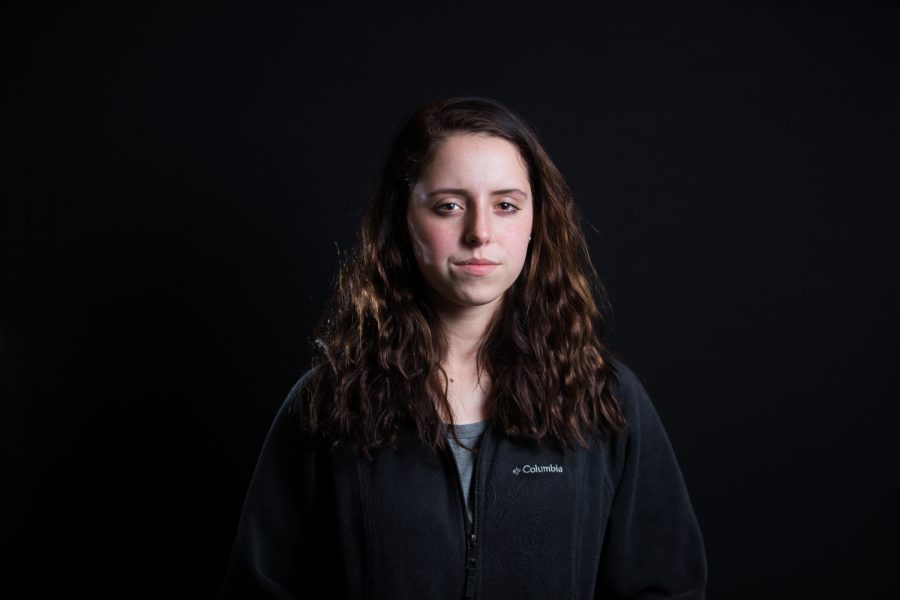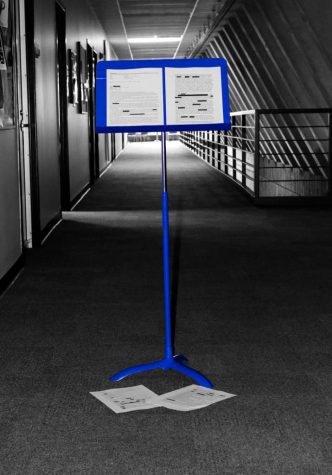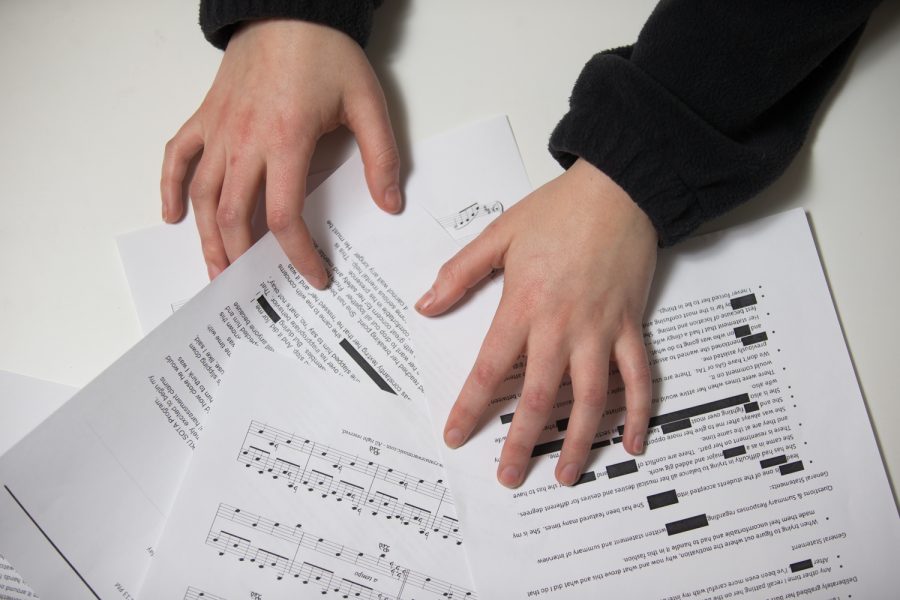Following a sexual harassment case in late October 2017, choral studies director Dr. Randy Pennington resigned after investigations found that he violated NKU’s sexual harassment policy.
Student: ‘I didn’t want there to be a girl after me’
Students, faculty reported choral director touching, texting
April 11, 2018
Editor’s Note: The Northerner obtained a copy of the NKU Office of Title IX investigation into the behavior of SOTA choral studies director Dr. Randy Pennington through an open records request. During the investigation, witnesses who experienced harassment and came forward did so confidentially. In order to protect their privacy and encourage more witnesses to come forward in the future, we decided to withhold their names. Natalie Brady shared her story with us through an interview, and again through written documents submitted to Title IX.
As a freshman, she was self-conscious and lonely—qualities she believes were later taken advantage of by Dr. Randy Pennington, who resigned as NKU’s choral studies director in March.
In 2015, the then-17-year-old Natalie Brady remembers feeling unease almost from the start, during private lessons with Pennington on “scatting,” or vocal improvisation. Pennington would invite her to sit at a piano bench in his office; it was small, and they were a “paper-length” apart. If she tried to scoot away, he would scoot closer, she said.
In an interview, she said he would touch her during the lessons, and linger—a pat on the back with a hand that gradually slid further down. And, with each lesson, he became more bold. She said he would graze her breast or thigh, then brushing it off as an accident. After their lessons went on, she said he would touch her without a word.
Last October, Brady, three other students and a faculty member reported Pennington’s behavior to the NKU Office of Title IX. Brady handed over texts Pennington sent her and gave a statement detailing years of sexual harassment and emotional manipulation, according to investigation documents obtained by The Northerner.
Faculty members also reported bullying and drinking that Pennington brought to campus, according to the documents.
Pennington was put on administrative leave on Oct. 27, 2017, and he has not taught at NKU since. Investigators concluded he violated NKU’s sexual harassment policy, and after an involuntary separation in March, Pennington left the university.
Brady remembers him playing with her hair; when he was upset, she said he would wrap it around his hand, pull, and tilt it upward so that she would look at him.
“There was one lesson he tried to hold my hand and kept trying to kiss me on the head,” Brady wrote in her testimony. “I would pull away, but this would not deter him.”
Her memories of Pennington stretch back to before she even chose NKU. In April 2015, she shadowed a vocal jazz rehearsal with aspirations of becoming a professional musician. At first, Brady described him as “almost fatherly”—similar to the mentor she found in her high school band director.
That first impression would soon crumble.
During a concert in November 2015, Brady said that Pennington pulled her aside to compliment her about how “attractive” and “sexy” she was.
“He started talking to me and he was like ‘these people are below you, you’re too good for them,’” she recalled in an interview.
After that, Brady said Pennington became more “touchy” during lessons. He would call her into his office and shut the door. His motto still reverberates: “Whatever happens in this office stays between us.”
It was here, with the door shut, that Brady said he would make comments about her appearance, her outfit and about other students and faculty members that bothered him.

Natalie Brady is a junior pursuing vocal jazz. In October 2017, she reported sexual harassment to NKU’s Office of Title IX.
Other witnesses come forward
Three other students and a faculty member complained to Title IX that Pennington touched them inappropriately and made overtly suggestive remarks, according to investigation documents obtained by The Northerner.
The investigation named seven School of the Arts faculty as possible witnesses to Pennington’s behavior, including director Ken Jones, associate director Thom McGovern, former music department chair and associate professor Kurt Sander, assistant provost and associate professor Jason Vest, and two faculty members that asked The Northerner not to release their names.
“It was more about the girls than me,” a faculty complainant who asked to be kept anonymous told The Northerner.
One complainant told investigators Pennington slapped her on the backside with a binder. Students and faculty remembered his hands lingering, sliding down their backs and smacking or grabbing their backsides.
Another complainant said she felt like Pennington would stare at her. On a day she wore a certain top, she asked a friend to borrow a sweatshirt just for Pennington’s class.
Another time, when one of the complainants was having a bad day, Pennington tried to comfort her. Then, she said Pennington put his hand on the back of her neck.
“It was firm. There was applied pressure. I felt like he was trying to intimidate me more than comfort me,” her statement read.
A faculty complainant said she got along with Pennington for seven years until the last week he was at NKU.
“As we were walking out of the elevator he slapped my butt. He said I’m sorry I know that’s sexual harassment and laughed,” she wrote. “I said ‘well as long as you know.’”
One faculty member reported that Pennington told her at a 2016 concert, “if only in your younger days I would have liked to…,” but did not finish his sentence before she told him to “piss off.”
“He’s known for his extra-long hugs, the slipping of hands and inappropriate comments,” the complainant told investigators.
Pennington told investigators he remembers saying “I remember when you were wild and crazy” and said her views are “colored” because she was not chosen to sing in a concert.
Another faculty complainant reported that, when she moved into her office, Pennington stopped by and joked that “he would have sex so loud in here they had to move him.”
That complainant also told investigators that Pennington “was not shy of letting people know his power.” She reported that she felt like, with his power and pull of contacts, he would pressure students to do certain choirs or ensembles. She said it was not uncommon for Pennington to rub female coworkers backs or to call them “sweetie” or “darling”.
Director of SOTA Ken Jones told investigators he heard rumors of sexual harassment, but no students came forward. Jones also said no one reported anything to him about Pennington regarding sexual harassment.
Former music department chair Kurt Sander told investigators there were a number of times a student would almost come forward about harassment, but would end up leaving the university.
“I heard it was an issue when I got here 13 years ago,” Sander told investigators.
SOTA faculty reported feeling bullied and intimidated by Pennington, saying he sometimes threatened that he had keys to their offices.
Pennington admitted that he got into a confrontation with associate director Thom McGovern during a meeting: he stood over a table and pointed his finger in McGovern’s face, saying “I’m warning you.” McGovern retorted, “You don’t warn me.”
Faculty also reported Pennington regularly exerted his power over junior employees and freshmen students. A complainant said Pennington would remind faculty below him in rank how “beneath him” they were. Pennington admitted he would call certain students “weak links,” but added that he pressures all students who are not performing at their best.
In reference to these claims, Pennington’s attorney, N. Jeffery Blankenship, stated that as a professor and choral director, Pennington acknowledges that part of his job was to evaluate student and faculty performance.
“But, he endeavored to perform those duties in a constructive way, intended only to build up and improve the performance,” Blankenship said in an email to The Northerner, adding that “while he cannot account for personal sensitivities and perceptions,” Pennington never intentionally used the aforementioned phrases and instead opted for “terms of a more teaching or instructive nature.”
Some faculty said Pennington’s behavior was amplified by alleged drinking at work, according to initial investigation interviews.
Within the documents, Sander said he “knows for a fact” Pennington came to campus intoxicated on different occasions. He said he reported the behavior to three deans: “You could smell it on him.”
Jones told investigators he could smell alcohol on Pennington while the two were touring elementary schools.
“There is probably not a soul on campus that does not know about his drinking,” McGovern stated in his testimony to investigators.
In a 2014 email to then-president Geoffrey Mearns, Provost Sue Ott-Rowlands reported student and parent complaints of Pennington being too impaired to drive students home from a concert festival.
According to the investigation documents, McGovern said there is no official record of Pennington being disciplined for having or drinking alcohol on campus. His personnel file contains no record of discipline for drinking.
‘I tried to stay away from him’
At a concert in March 2016, Brady remembers Pennington staring at her when she was wearing a dress with a low back.
“Then he came up to me and was like ‘if I were anybody—if I was your age—you couldn’t imagine the things that I could do to you.’” she recalls Pennington saying. After, she ran to the bathroom out of shock.
When she came out of the bathroom, she recalls him noticing that she was shaken up. During a soundcheck, he nagged her about her solo. So, she flipped him off in public—a moment she said he held against her. Later that night, she apologized. It was then she told her parents.
“They knew the whole time,” she said.
The day after the concert, Brady started dating her first college boyfriend. She felt like Pennington’s demeanor turned cold and angry. She said he called her into his office where she recalls him saying, ‘“you broke my trust. You have so much potential, but you’re never going to get anywhere if you start flipping off the people you care about.’”

Dr. Randy Pennington was the director of choral studies; Natalie Brady had several of his classes.
During rehearsals, she said he began to call her out in front of everyone, his face soured.
After a few months, her relationship ended. In May 2016, during a chamber choir trip to Canada, Brady said Pennington admitted that he had been angry with her for months for dating someone else. At the bar, he told her he felt no one else “deserved” her and that she needed a “man” like him instead of the “boy” she was seeing.
In the same conversation, Brady said Pennington threatened to keep her out of the vocal jazz ensemble if she did not audition for his chamber choir. Even if she did happen to get into vocal jazz, he told her she would get no solos.
During her sophomore year, she said Pennington offered her a $2,000 scholarship to stay in chamber choir. She was broke, so she felt like she had to.
“I tried to stay away from him, but he kept inventing these new reasons for me to stick with him,” Brady said.”I tried to not be alone with him. I tried to leave the door open if I went into his office.”
A few times, she hit him after he touched her inappropriately. But, she said he “just thought it was a game.”
Pennington took leave in spring 2017 after he was diagnosed with cancer. Despite being physically away, the harassment continued, according to Brady. She said Pennington texted her nonstop and asked her to call him while she was in class. When she didn’t answer, he told her that he felt ignored, forgotten and neglected.
In messages Brady shared with The Northerner, Pennington told her he had “a dirty and weird mind.”
“You were dressed to kill today. Trying to attract someone or just feeling good. We all noticed. Have a good weekend. R,” read one message.
“My life is not the same without seeing you everyday,” he wrote in another.
“Remember what I share with you is private! Don’t feel we are close anymore. Did I step over the line?”
‘It was a good day, a real good day’
When Pennington returned in fall 2017 after his cancer went into remission, Brady thought as long as she took the brunt of the abuse, it would keep him from harassing other women.
Then, she met another victim (and former student) of Pennington’s at an alumni choir event. Together, they compared their experiences—the touching, suggestive comments and inappropriate behavior.
“She was the girl before me. And I remember talking to her about it, and she was like ‘well if you just stick with it, you get a lot of really cool and good opportunities out of it.’”
But, she didn’t want there to be a girl after her. Brady felt as if she had to do something.
“He totally turned my world upside down in really bad ways, and I can’t let that happen to more people,” she said.
When she finally told Ann James, the Title IX coordinator, Brady cried.
“I had class with him right afterwards,” she said. “But, it felt good. I evil-eyed him the whole time, and then he was escorted off-campus a week later.”
Pennington’s response
In response to Brady’s statement, Pennington told investigators he invited her to sit at the piano bench during lessons because there was no other chair in his office and denied moving closer to her. The only touching that went on was having her tap his leg because she was off-rhythm, he said, and he did not touch her backside or breasts.
Pennington did tell investigators he thinks Brady is “very much a diva” and “takes things the wrong way.”
“She expanded her importance in her mind to me and to the program. She feels like she is the program and in some ways she’s right,” Pennington said in an investigation interview.
He also said he never forced Brady to be in his choirs, and cited “conflicts in her schedule” as reasons for placing her in his singing groups.
Suggesting Brady should date a “man” like him on the Canada trip never happened, Pennington claims. He only gave her “advice” to look for someone more “mature.”
He added that he never told Brady he had feelings for her but “cared about her and her progress.”
Documents said Pennington even suggested Brady had a secret crush on him.
While he denied playing favorites with his students, he told investigators he noticed competition for his favor: “My favorite is whoever [is] willing to do what needs to be done.”
Pennington declined to comment for this story and referred The Northerner to his attorney.
Pennington “emphatically and unequivocally denies the claims of bullying and drinking on the job,” according to Blankenship. Though, Pennington said he did have a conversation with director Jones about bullying and had apologized to McGovern for the “heated interaction.”
The claims of bullying “would have been a rare occurrence but it isn’t outside the realm of possibility that voices (on both sides) may have been raised,” Blankenship stated, calling the characterization an “inflammatory term intended to incite negative conniptions, but has no real legitimate basis in fact because Dr. Pennington has never ‘bullied’ anyone, as that term is generally used.”
In a statement, Blankenship said Pennington is innocent, and that the university ousted him to make up for bad publicity caused by another recent workplace harassment scandal. In December, Chase Law Dean Jeffrey Standen resigned after a university investigation found he created “an unhealthy culture of fear, intimidation and bullying” in his office.
“We believe, therefore, that NKU is proceeding in a self-serving manner intended only to protect its self-interest and improve its public image,” Blankenship’s statement read.
Citing “fatigue” from his cancer diagnosis, Pennington maintains his innocence but will not fight for his reputation.

The Title IX investigation documents were obtained through an open records request.
Through darkness, Brady looks forward
Brady hasn’t had contact with Pennington since the investigation started—he’s not allowed to reach out. As a result, for the first time in her college career she said she feels safe walking the halls of NKU’s School of the Arts.
“When he was here, I couldn’t walk around without running into him and being dragged into his office to the point where I would do as much as I could to not avoid him if possible.” Brady said.
He’s not here. She’s free from that worry. Simple moments, like dressing in the morning without having to be conscious of if she would see him that day, are now back in her control.
Brady doesn’t want this to happen to others. Stemming from a project in a feminist punk rock honors’ class, she created a concept for circle-based, proactive seminars. These seminars are meant to recognize issues—like sexual harassment—and not only point it out, but pinpoint future solutions.
“It’s really close to my heart right now, because of all of [the investigation],” she said. “It’s nice to be pursuing something that matters to me.”
The idea is to come up with a plan during the seminars and lay out the groundwork to incorporate them on campus and in the community.
“And I know this stuff will still happen, because the world is dark,” she said, adding that her goal is to keep cases likes hers from happening in the future.
If you’ve been sexually assaulted or harassed, there are resources for you. Visit the Norse Violence Prevention Center online or in person in SU 304 8:15-4:30 Monday-Friday. The NKU Ethics & Compliance Hotline is available 24/7, and anonymous reports can be made at 1-855-597-4539 or www.nku.ethicspoint.com. Call (800) 656-4673 to be connected with trained staff of RAINN’s Sexual Assault Hotline. Call the Women’s Crisis Center in Covington 24/7 at (800) 928-6708.

